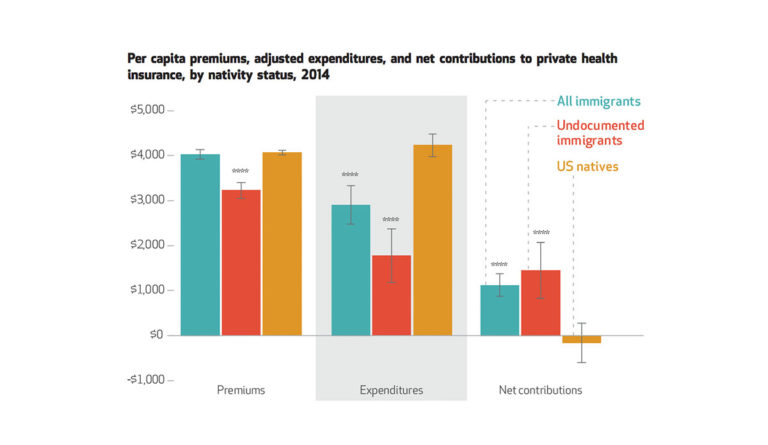Immigrants and Private Insurance: Pay More, Use Less
New research in Health Affairs upends the belief that immigrants are a drain on the US health care system.

Read Time: 2 minutes
Published:
Between 2002 and 2009, immigrants paid an estimated $115.2 billion more into Medicare than they used. However, half of immigrants are covered by private insurance so it is important to understand contributions and expenditures in that type of insurance as well.
A study published in Health Affairs used data from the Medical Expenditure Panel Survey (MEPS) to measure both premiums and expenditures from private health insurance. Data from the Medical Expenditure Panel Survey and the National Health Interview Surveys were linked for this study.
The graph above shows the premiums, expenditures, and net contributions of all documented and undocumented immigrants and US natives. Both groups of immigrants had positive net contributions, meaning they paid more toward their private insurance coverage than they spent in receiving health services. Undocumented immigrants had an even higher net contribution (Yes, undocumented immigrants get paychecks and these paychecks have deductions). US natives had a negative net contribution, meaning that, per capita, their expenditures on health care were greater than their premiums.
These findings upend the common belief that immigrants are a drain on the US health care system. Indeed, the opposite is true. Immigrants who contribute to Medicare and to private health insurers are subsidizing the health care of US citizens.
Databyte via Leah Zallman, Steffie Woolhandler, Sharon Touw, David U. Himmelstein, and Karen E. Finnegan, Immigrants Pay More In Private Insurance Premiums Than They Receive In Benefits. Health Affairs.



